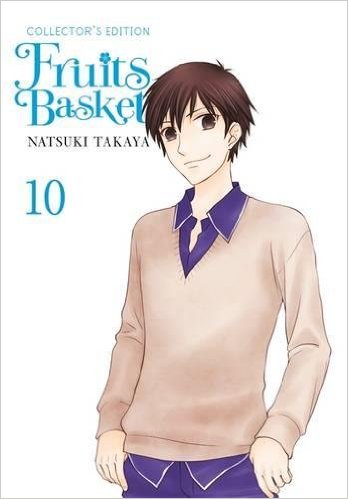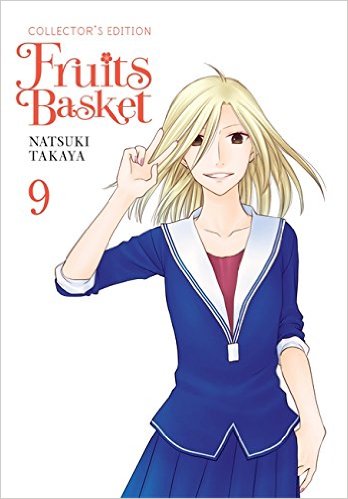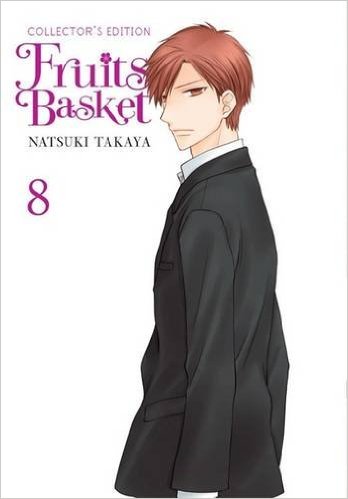By Natsuki Takaya. Released in Japan by Hakusensha, serialized in the magazine Hana to Yume. Released in North America by Yen Press. Translated by Sheldon Drzka.
Yen Press’ rush release of these omnibuses has been a bit disorienting at times, and because I’m giving each of them full reviews it sometimes feels like I was only just talking about the last book and here’s another one. (It’s been about 3 1/2 weeks since I reviewed Vol. 9). That said, one can never, ever run out of things to talk about when discussing Fruits Basket, so no worries on that end. As Takaya herself says, we’re beginning the home stretch here, and many mysteries are being cleared up now that the biggest of them all has been revealed. We see why Kakeru has been so on edge around Tohru, and finally meat his semi-mythical girlfriend Komaki (who for a moment looks as if she may stay with a ‘hidden face’ before getting revealed a bit later), and we get Kyo starting to explain exactly why he feels tremendous guilt and pain when he thinks about Tohru’s mother.
Speaking of Tohru, this volume is probably her low ebb. Her inability to reveal the fact that she loves Kyo is shown to have explicit ties to her idolization of her mother and the trauma of her passing, as well as a somewhat understandable complete misunderstanding of how loving someone actually works. Shigure, who in the past gave her nice, calm, friendly advice, is perhaps getting a bit too attached to her, as he now proceeds to slam at all of her buttons at once, trying to break past her traumas and get her to admit what she doesn’t want to. It hasn’t worked on Akito, and there’s no reason it’d work on Tohru, but it does show how he may feels about her now, and winds up with Shigure wondering, to the reader’s horror, what might have happened if he’d dreamt of Tohru rather than Akito.
As for Akito, well, much of the book is spent with her holed up and avoiding everyone, having a massive sulk after recent events. We finally get some backstory regarding his father (who reminds me of Yuki quite a bit, something I think Akito herself is also aware of), as well as, unfortunately, more insight into Ren, who we see Akito seems to get her selfishness and tendency towards insane tantrums from. Akito at least is seeing the cursed Sohmas gradually break away from her – more on that later – but Ren is given no real reason for her abusive nature beyond being a petty, selfish and violent person. Her attack on Akito is unfortunately, not so much for her as because it gives Akito a knife, which leads to bad things later on.
I’d mentioned two more curses break here, one right after the other – Momiji and Hiro’s. Hiro, possessing an actual warm and loving home life and with his angst over Kisa and Rin mostly being resolved, is not much of a surprise, and the revelation is quite heartwarming. Momiji is more startling, particularly in the somewhat unrealistic way he’s grown up and, frankly, become almost unrecognizable – I’ve talked before about when Takaya’s art morphed from its early Furuba faces to late ones, and despite her hurting her hand after Vol. 8, I think it’s more around here that we see it. Momiji is no longer cursed, but of course he can’t return to his family, and he already knows he’s not going to win Tohru’s love, despite his words to Kyo. So what’s left is a deep loneliness, but also a yearning to make a brilliant future for himself.
More to discuss, as always! Ayame angering an already angry BL fandom by admitting that Mine is his girlfriend, and showing off some casual cruelty towards a love confession when he was in high school that will make your jaw drop (Hatori is appalled, Shigure just amused). Kagura may barely appear in the series anymore, but she makes her appearance count, getting upset at Tohru waffling about her love for Kyo to the point where she belts Tohru in the head – which a) should give Tohru a concussion and possibly hospitalize her, given this is Kagura, and b) leads to a wonderful bit where Rin witnesses this and loses her shit, screaming that Kagura has no right to hit anyone. (Kagura, very pointedly, apologizes to Rin but not Tohru.)
And now everything is terrible, basically. (I didn’t even talk about Shigure’s scenes with Ren, in which acid meets… well, even more corrosive acid.) Kureno is stabbed (and hey, that maid wasn’t fired after all!), Akito is walking around town with a knife and not in the best frame of mind, and Kyo is telling Tohru that he a) thinks he killed his mother, and b) thinks he killed HER mother. Can things possibly get worse? Hell yes. In any case, Fruits Basket: still wonderful.





